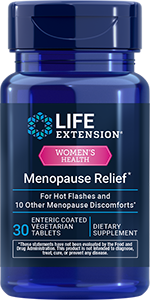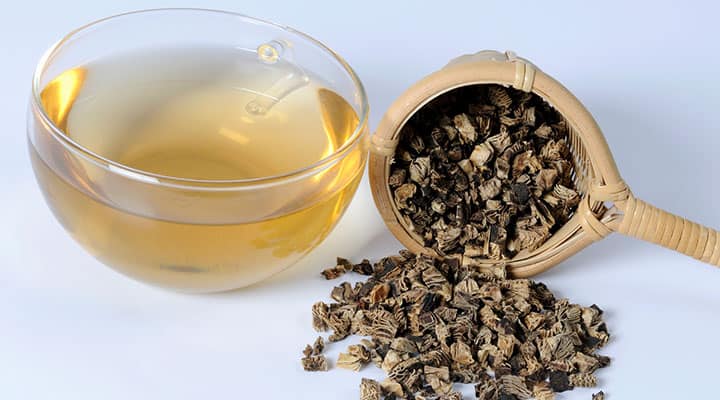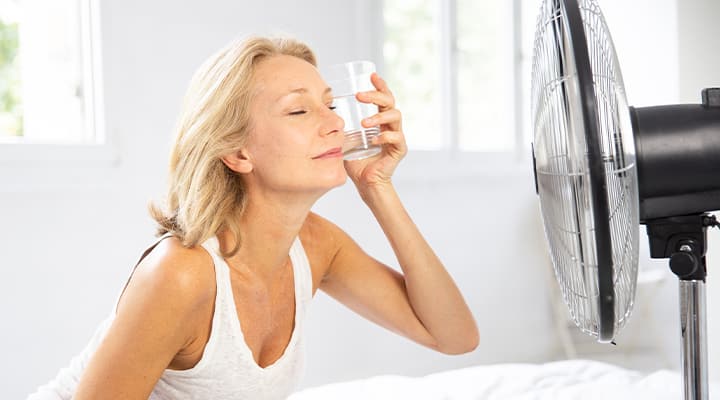
8 Best Perimenopause Supplements
Published: May 2024
Just as her first menstrual cycle marks a significant milestone in a woman's life. The onset of menopause, when menstrual periods stop, represents another.
Like they did in adolescence, women's bodies go through what can feel like a hormonal rollercoaster, and this time around, it can last for several years. This is perimenopause, the transitional stage before full-on menopause, and it can bring on a whole slew of discomforts that can impact our daily lives.
The mood swings and restlessness of this time might remind you of your teen years, but the hot flashes and senior moments? Those are new and not welcome.
They are also not uncommon. In fact, as many as 75% of women feel discomforts like hot flashes, sweaty nights and mood swings.
Fortunately, nutritional supplements and lifestyle modifications can help manage the discomforts of perimenopause and promote comfort and well-being during this transitional phase. Let's explore the best menopause supplements and strategies to help you navigate this phase of life with confidence and well-being.
What is perimenopause?
It's important to distinguish the different stages of menopause: perimenopause, menopause and post-menopause. Recognizing these stages and their hallmarks can help you manage your health effectively during this natural life transition.
Perimenopause
, sometimes called the menopausal transition, is the period leading up to menopause. During this time, which typically lasts four to eight years, estrogen levels in the body fluctuate. This can lead to discomforts like hot flashes, mood swings and fatigue. Perimenopause ends when a woman goes 12 consecutive months without a period.Menopause
is confirmed after 12 months without menstruation. Menopause marks the end of a woman's reproductive years due to decreased estrogen production. Common discomforts include hot flashes, night sweats, sleep disturbances, vaginal dryness and weight gain.Post-menopause
follows menopause and extends throughout the rest of a woman's life. Because women are living longer, many now spend more than a third of their lives in post-menopause.
What is the average age for perimenopause?
Perimenopause usually begins about 8 to 10 years before menopause. It typically starts in your mid-40s, but it can start as early as your mid-30s and as late as your mid-50s. Perimenopause can last anywhere from a few years to even 10 years, but the average length of perimenopause is about four years.
You'll only know you're officially out of perimenopause and in menopause after a year of no periods, which typically occurs between the ages of 46 and 52, with the average age of 51 in the United States. However, the timing of menopause varies widely and can be influenced by various factors, such as your genetics and lifestyle.
What are the best supplements to take for perimenopause?
Here are the top menopause supplement ingredients to support your health and comfort during the menopausal transition.
1. Siberian rhubarb
Nutritional interventions for perimenopause often contain phytoestrogens, plant compounds that support estrogen receptors. One such product is Siberian rhubarb extract, which is derived from the root of Rheum rhaponticum.
Siberian rhubarb can help provide relief from common perimenopausal discomforts, including hot flashes, night sweats, irritability, mood swings, sleep issues, joint and muscle discomfort, and vaginal dryness.
A controlled trial involving perimenopausal women showed supplementation with 4 mg of Siberian rhubarb extract daily for 12 weeks significantly supported menopausal comfort. Compared to placebo, women taking Siberian rhubarb extract experienced reduced hot flashes and less menopausal discomfort. These findings were confirmed in longer-term studies that found further support for menopausal comfort.
This research suggests Siberian rhubarb extract may offer a safe and effective option for managing perimenopause discomforts and help enhance quality of life.
2. Soy isoflavones
Soy is rich in phytoestrogens known as isoflavones, which have been studied for their potential benefits during menopause. One notable effect of soy isoflavones is that they may be able to reduce hot flashes, providing relief for women with this common discomfort.
In addition, research suggests soy isoflavones may offer multiple health benefits for postmenopausal women, such as encouraging bone health, supporting already-healthy lipid levels and glucose metabolism, and potentially supporting heart health.
3. Fenugreek
Fenugreek is a multipurpose herb that has been used for centuries in countries like Iran, India, and China. Fenugreek seeds are often used as a spice in cooking and for adding flavor to curries and chutneys. It's also commonly used for its healthy properties, such as promoting digestion, relieving menstrual discomfort, and supporting lactation.
One of the key components of fenugreek is diosgenin, a phytoestrogen that may contribute to its beneficial properties and menopausal discomfort relief. In a trial of perimenopausal women, supplementation with 500 mg of fenugreek extract daily supported menopausal comfort. Participants experienced reduced discomforts, particularly hot flashes, night sweats, mood swings and sleep disturbances. These findings highlight fenugreek as a promising ingredient for perimenopausal women seeking relief from discomforts and support for hormonal health.
4. Red clover
This flowering plant belongs to the legume family and has distinctive reddish-purple flower clusters. Rich in isoflavone phytoestrogens, red clover has been studied extensively for its potential health benefits, particularly in relation to menopausal discomforts. A meta-analysis of placebo-controlled trials found that red clover can effectively reduce the incidence of hot flashes in perimenopausal and postmenopausal women.
However, further exploration is needed to fully understand its mechanisms of action and to optimize its use for hormonal support.
5. Black cohosh
Black cohosh is a perennial herb native to North America. It has been traditionally used to support women's health, particularly during menopause. It's known for its potential to reduce hot flashes, sweaty nights and mood swings, to name a few.
A comprehensive review of 35 clinical trials found that black cohosh extract helped relieve menopausal discomforts.
How black cohosh works is not fully understood. Some compounds in black cohosh have been shown to act on serotonin and other neurotransmitter receptors. This could contribute to its ability to alleviate menopausal discomforts such as hot flashes and mood swings.
6. Supplements for bone health
Postmenopausal women benefit from additional bone health support, and adding supplements to your routine at this stage of life can be beneficial.
Calcium is the most abundant mineral in the human body and is essential for maintaining strong bones. Vitamin D helps the body absorb optimal levels of calcium, and vitamin K2 works with vitamin D to help guide calcium to the bones, contributing to healthy bone density. Magnesium is another mineral that's involved in bone mineralization and helps support calcium levels in the body. You can consider taking individual supplements or a comprehensive nutritional supplement that combines these ingredients and has synergistic effects for optimal bone density and health.
7. Supplements for heart health
After menopause, women also benefit from additional heart health support, so it's crucial to prioritize heart health during this stage of life. Incorporating certain supplements into your daily routine can help.
Coenzyme Q10 (CoQ10) is a powerful antioxidant that plays a vital role in energy production in our cells and helps protect against oxidative stress. Fish oil, which is rich in omega-3 fatty acids, supports cardiovascular health by helping to maintain already-healthy blood pressure and already-healthy cholesterol and triglyceride levels.
8. Supplements for sleep
If you have restless nights during perimenopause, you are not alone. Hormonal changes often lead to less-than-ideal sleeping patterns. Melatonin, a hormone naturally produced by the body, plays a crucial role in regulating the sleep-wake cycle. A melatonin supplement may help with relaxation and getting a restful night's sleep. And getting a solid night of quality, uninterrupted sleep can help you effectively manage other challenges associated with menopause, boost your mood and promote your overall well-being.
Explore Our Best Women's Health Supplements
How can I help support my hormones during perimenopause?
Navigating perimenopause can be challenging, but you can take steps to support your hormones and overall well-being during this time.
First and foremost, it's essential to have open communication with your healthcare provider. They can provide valuable guidance and may offer various options, including nutrients and lifestyle changes.
In addition, incorporating phytoestrogens into your diet may offer benefits for some women. Supplement ingredients like Siberian rhubarb extract, soy isoflavones and red clover contain phytoestrogens and have shown promise in alleviating menopausal discomforts and supporting hormonal health.
Making healthy life choices is also key. A balanced diet rich in fruits, vegetables, whole grains, and lean proteins can provide essential nutrients to support your hormones. Try incorporating phytoestrogen-rich foods like soy and flax seeds into your meals to help support estrogen balance. And don't forget cruciferous vegetables like broccoli, cabbage, and kale, which can help support healthy estrogen metabolism. These foods are encouraged in most eating plans, including vegan diets.
Regular exercise has many benefits for your health, including improving cardiovascular health and helping with weight management. It can also help alleviate perimenopausal discomforts like hot flashes and mood swings.
Prioritizing quality sleep, encouraging relaxation and managing stress can also help support hormone health during perimenopause. Managing stress can help reduce menopausal discomforts like hot flashes.
Interested in getting a personal recommendation about the nutrients that might help support women's health? Take our health needs quiz and get advice tailored to you.
References
- Barańska A, et al. "Effects of Soy Protein Containing of Isoflavones and Isoflavones Extract on Plasma Lipid Profile in Postmenopausal Women as a Potential Prevention Factor in Cardiovascular Diseases: Systematic Review and Meta-Analysis of Randomized Controlled Trials." Nutrients. July 2021. https://pubmed.ncbi.nlm.nih.gov/34444691/
- Castelo-Branco C, et al. "Review & meta-analysis: isopropanolic black cohosh extract iCR for menopausal symptoms - an update on the evidence." Climacteric. April 2021. https://pubmed.ncbi.nlm.nih.gov/33021111/
- Chen LR, Chen KH. "Utilization of Isoflavones in Soybeans for Women with Menopausal Syndrome: An Overview." Int J Mol Sci. March 2021. https://pubmed.ncbi.nlm.nih.gov/33809928/
- Fang K, et al. "Soy isoflavones and glucose metabolism in menopausal women: A systematic review and meta-analysis of randomized controlled trials." Mol Nutr Food Res. July 2016. https://pubmed.ncbi.nlm.nih.gov/27004555/
- Hasper I, et al. "Long-term efficacy and safety of the special extract ERr 731 of Rheum rhaponticum in perimenopausal women with menopausal symptoms." Menopause. January-February 2009. https://pubmed.ncbi.nlm.nih.gov/18978638/
- Henneicke-von Zepelin HH. "60 years of Cimicifuga racemosa medicinal products: Clinical research milestones, current study findings and current development." Wien Med Wochenschr. May 2017. https://pubmed.ncbi.nlm.nih.gov/28155126/
- Kanadys W, et al. "Evaluation of Clinical Meaningfulness of Red Clover (Trifolium pratense L.) Extract to Relieve Hot Flushes and Menopausal Symptoms in Peri- and Post-Menopausal Women: A Systematic Review and Meta-Analysis of Randomized Controlled Trials." Nutrients. April 2021. https://pubmed.ncbi.nlm.nih.gov/33920485/
- Kaszkin-Bettag M, et al. "Confirmation of the efficacy of ERr 731 in perimenopausal women with menopausal symptoms." Altern Ther Health Med. January-February 2009. https://pubmed.ncbi.nlm.nih.gov/19161045/
- Khanna A, et al. "Efficacy of a novel extract of fenugreek seeds in alleviating vasomotor symptoms and depression in perimenopausal women: A randomized, double-blinded, placebo-controlled study." J Food Biochem. December 2020. https://pubmed.ncbi.nlm.nih.gov/33025616/
- Mohammadalizadeh Charandabi S, et al. "Quality of life of postmenopausal women and their spouses: a community-based study." Iran Red Crescent Med J. March 2015. https://www.ncbi.nlm.nih.gov/pmc/articles/PMC4441780/
- Mohapatra S, et al. "Benefits of Black Cohosh (Cimicifuga racemosa) for Women Health: An Up-Close and In-Depth Review." Pharmaceuticals (Basel). February 2022. https://pubmed.ncbi.nlm.nih.gov/35337076/
- Sathyapalan T, et al. "Soy isoflavones improve cardiovascular disease risk markers in women during the early menopause." Nutr Metab Cardiovasc Dis. July 2018. https://pubmed.ncbi.nlm.nih.gov/29739677/
- Sun W, et al. "Fenugreek Cultivation with Emphasis on Historical Aspects and its uses in Traditional Medicine and Modern Pharmaceutical Science." Mini Rev Med Chem. 2021. https://pubmed.ncbi.nlm.nih.gov/33245271/
- Wong C, et al. "Mindfulness-Based Stress Reduction (MBSR) or Psychoeducation for the Reduction of Menopausal Symptoms: A Randomized, Controlled Clinical Trial." Sci Rep. April 2018. https://www.ncbi.nlm.nih.gov/pmc/articles/PMC5919973/
- "Menopause (Nursing)." National Library of Medicine. https://www.ncbi.nlm.nih.gov/books/NBK568694/
- "What Is Menopause?" National Institute on Aging. September 2021. https://www.nia.nih.gov/health/menopause/what-menopause











